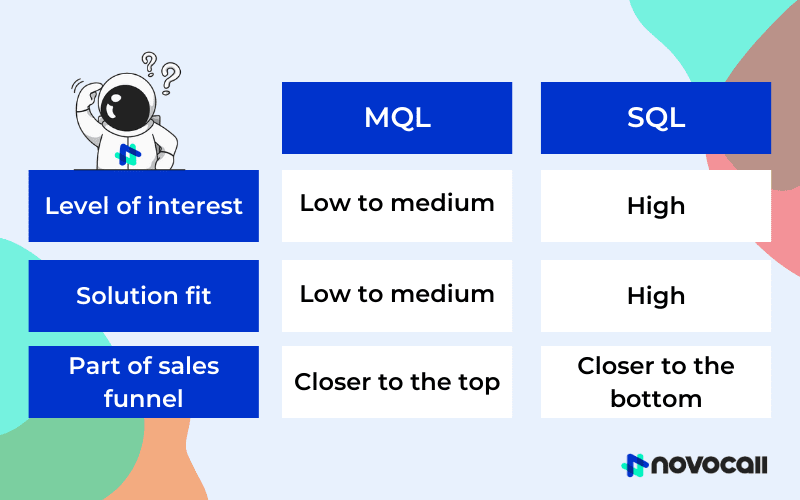

Start driving better conversations.
Novocall will be your new favorite business phone system.

Many people have this misconception that terms like “qualified leads” and “conversion” have one standardized meaning. That could not be further from the truth 🙅♂️
The meaning of these words actually depends on how each company defines these terms. But one thing is certain. You need them to generate revenue.
So how then should you define your terms and how do you generate more qualified leads? Let’s delve right in!

Let’s unpack this.
The primary use of the word “qualified” is to refer to someone who is recognized or certified to perform a particular task. Meanwhile, a lead is someone who has expressed interest in your business based on the criteria you defined.
Simply put, qualified leads are people who have shown clear indication that they are interested in your business and have converted. What counts as a qualified lead will vary from business to business.
Generally speaking, there are two main types of qualified leads. Marketing-qualified leads (MQLs) and sales-qualified leads (SQLs).
A key characteristic of an MQL is that they are LESS interested in SQLs in your business.
Businesses typically identify these types of leads by the kind of actions they take to convert. For instance, they may sign up for your company’s content newsletter.
Remember, just because they provide you with their contact information does not mean that they are interested in your solutions… They may just want free content delivered directly to their emails.
But not all is lost. You can still nurture these MQLs into SQLs and even convert them into customers. We’ll talk more about that in a bit 😉
Note that there are many types of actions a potential MQL can take to become an MQL. it all depends on how your business defines conversion. With that said, let’s take a look at some of the most common forms of conversion:
If you’ve noticed by now 👀, many of the behaviors that indicate interest requires the potential MQL to provide you with their contact information. This means that the MQL generation process is largely inbound.
You can start off by growing your site’s inbound traffic organically via a well-conceptualized SEO strategy, or ads and set up lead capture forms on your website using form building tools.
For example, Novocall’s click-to-call software widget is embedded onto your website and helps you collect the contact information of your site visitors.

It does this by allowing your site visitors to request a scheduled or immediate callback from your company.
💡 Read more: Check out our list of the top 20 lead generation software you can consider for your business.
An SQL is a lead that has been converted by the marketing team and qualified by the sales teams as leads with problems that your solution can address. SQLs are sometimes referred to as prospects. SQLs are also more interested in your solution than MQLs.
As mentioned above, an SQL was first recognized by the marketing team to be an MQL before being handed over to the sales team. This means that each SQL has taken an action that your business has defined as an indicator of interest or a converting action.
Once the MQL has been handed over to your sales team, they need to qualify your MQLs using a variety of lead qualification questions.
These questions will help your business filter out leads who are less of a fit for your business. Those that remain will then be considered SQLs.
💡 Read more: Check out the different lead qualification frameworks we discussed in this article and how they help lead to scheduled demos.
MQLs can be converted into SQLs via two main ways.
If your business defines a converting action as one that requires your site visitors to provide you with their contact information, one way to convert MQLs into SQLs is through email nurturing.
To do this, you need to create automated email campaigns with content relevant to your MQLs. You should split your email sequence into several stages based on the marketing funnel. The goal is to ‘push’ your MQLs down the marketing funnel until they convert into SQLs. The final few emails in your sequence contain your bottom-of-the-funnel (BOFU) articles and are typically used to convince your prospects why your solution fits them the best.
Another way to convert MQLs into SQLs is through the use of lead qualification questions and lead scoring. The way companies score leads will probably differ from one another.
Say a company uses the BANT (budget, authority, need, and timing) framework to qualify its leads, its sales reps can assign a score to leads based on their responses to the qualification questions. For instance, leads who respond to budget-related questions indicate that their purchasing power is closer to your business’s ideal, you can assign a higher score to these leads.
At the end of this process, leads with the scores that match your ideal range of scores, these MQLs will then be considered SQLs.

Well, neither. Every business needs both.
Sales reps cannot ask all your site visitors qualification questions if they’ve yet to indicate interest in your business and convert.
MQLs are necessary to help businesses monitor their marketing efforts to better understand how well they’re doing in growing their interest in your business.
An unqualified lead is one that has yet to be nurtured down the sales funnel or sales cycle. This can be due to several reasons. Perhaps they may not be sure if they need your solution. Or maybe they don’t have a sufficient budget.
Whichever the reason, unqualified leads are those who do not fit your ideal customer profile and are not ready to make the purchase.
And that’s it!
I hope you’ve gained a better understanding of how to define your qualified leads, how to identify them, and how to generate more of them. The key thing to remember here is that there is no all-encompassing definition of what a qualified lead is.
It really depends.
For more sales and marketing-related tips, subscribe to our blog below 👇👇👇

Nigel is a Digital Marketing Executive at Novocall where he specializes in SEO. Prior to this, he had written for several SaaS companies including Workstream and the now defunct Hatchme. In his free time, he engages in strength training and is a lover of languages.
Discover more
Subscribe to our blog
Get insights & actionable advice read by thousands of professionals every week.

